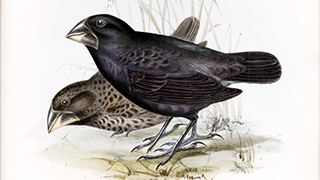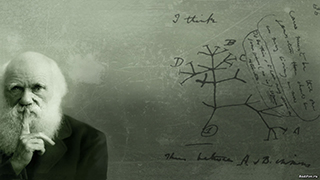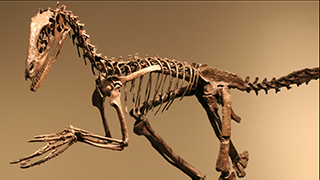Other Sites:
Robert J. Robbins is a biologist, an educator, a science administrator, a publisher, an information technologist, and an IT leader and manager who specializes in advancing biomedical knowledge and supporting education through the application of information technology. More About: RJR | OUR TEAM | OUR SERVICES | THIS WEBSITE
Recommended Videos
Advances in rRNA sequencing and other techniques have allowed scientists to characterize novel symbiotic partnerships. In her first lecture, Dr. Margaret McFall-Ngai provides an overview of the three main types of symbiosis: mutualism (both partners benefit), commensalism (only one partner benefit), and parasitism (one partner benefits, but the other partner is harmed). McFall-Ngai's research is currently focused on understanding the establishment and maintenance of symbiotic relationships, and the molecular effects that these relationships have on development, health, and disease.
Cloud computing has transformed the capability and agility with which businesses deploy information technology (IT). Cloud scalability and speed-to-delivery supports the spectacular increase in new products and services, delivered at a rate and volume which we now take for granted. And yet, grant-funded biomedical research has been slow to adopt the Cloud, even with current drivers like covid-19 as urgent motivators. The slow adoption of cloud-computing by grant-funded biomedical research institutions is not due to inertia, lack of resources, inadequate technical expertise, or other rate-limiting skill or resource factors. Instead, there is a profound mismatch between the typical commercial use of cloud services (to operate 24/7 production software in a revenue center) and computing in support of research (running batch-job programs in a budget-constrained cost center), that it is difficult to run scalable cloud services in support of research. Some of the cloud-computing advantages so obvious in the for-profit sector do not apply in a grant-funded research environment. Further, the defining characteristic of cloud computing — dynamic scalability with an unlimited pay-as-you-go pricing model — is particularly dangerous in a grant-funded environment.
Cloud computing is coming, and coming fast. Some estimates show the market for cloud services growing at 25% per year. Cloud computing is perhaps the most fundamental and profound change yet to occur in IT. Compared with other endeavors, computing is still an incredibly immature activity, characterized by learn as you go methods — much as characterized the early days of medieval church architecture: that looks good; like the new dome; oops, it fell down; wonder why? Cloud computing represents a major maturational step for computing in general, abstracting away most of the lower layers from the necessary attention of users. It is the future of computing. And yet... And yet, will it, can it work in a biomedical research environment? Do the cloud-computing advantages that are so obvious in the for-profit sector apply as well (or work at all) in a grant-funded research environment? What are the attributes of the grant-funded research environment that raise issues, pose challenges, possibly create limits to the full deployment of cloud computing in that environment?
The invention of digital information storage technology is allowing the amount of stored information on Earth to grow at an incredible rate. In 1986, 99% of stored information was in analog form; today 99.9% is digital. When n is approaching all, that is, when it is possible to access data on all relevant subjects, analyses change in both quantitative and qualitative ways. If "de-identified" data sets can be joined with other data sets, de-identification becomes impossible.
Bill Wurtz produces a genius summary of the entire world, big bang to now, in 20 minutes. The amount of accurate information (on physics, astronomy, biology, archaeology, history, philosophy, politics, and more) crammed into this brief, but fast-talking presentation is simply stunning. Watch for the quick summary of different schools of thought in ancient China (including the Legalists) — takes about a second. Nails it. It starts a little slow (there are several billions years to cover) but once the biology starts, it really gets moving. Stick with it until the microbes and you will probably watch it all the way through.
RJR Experience and Expertise
Researcher
Robbins holds BS, MS, and PhD degrees in the life sciences. He served as a tenured faculty member in the Zoology and Biological Science departments at Michigan State University. He is currently exploring the intersection between genomics, microbial ecology, and biodiversity — an area that promises to transform our understanding of the biosphere.
Educator
Robbins has extensive experience in college-level education: At MSU he taught introductory biology, genetics, and population genetics. At JHU, he was an instructor for a special course on biological database design. At FHCRC, he team-taught a graduate-level course on the history of genetics. At Bellevue College he taught medical informatics.
Administrator
Robbins has been involved in science administration at both the federal and the institutional levels. At NSF he was a program officer for database activities in the life sciences, at DOE he was a program officer for information infrastructure in the human genome project. At the Fred Hutchinson Cancer Research Center, he served as a vice president for fifteen years.
Technologist
Robbins has been involved with information technology since writing his first Fortran program as a college student. At NSF he was the first program officer for database activities in the life sciences. At JHU he held an appointment in the CS department and served as director of the informatics core for the Genome Data Base. At the FHCRC he was VP for Information Technology.
Publisher
While still at Michigan State, Robbins started his first publishing venture, founding a small company that addressed the short-run publishing needs of instructors in very large undergraduate classes. For more than 20 years, Robbins has been operating The Electronic Scholarly Publishing Project, a web site dedicated to the digital publishing of critical works in science, especially classical genetics.
Speaker
Robbins is well-known for his speaking abilities and is often called upon to provide keynote or plenary addresses at international meetings. For example, in July, 2012, he gave a well-received keynote address at the Global Biodiversity Informatics Congress, sponsored by GBIF and held in Copenhagen. The slides from that talk can be seen HERE.
Facilitator
Robbins is a skilled meeting facilitator. He prefers a participatory approach, with part of the meeting involving dynamic breakout groups, created by the participants in real time: (1) individuals propose breakout groups; (2) everyone signs up for one (or more) groups; (3) the groups with the most interested parties then meet, with reports from each group presented and discussed in a subsequent plenary session.
Designer
Robbins has been engaged with photography and design since the 1960s, when he worked for a professional photography laboratory. He now prefers digital photography and tools for their precision and reproducibility. He designed his first web site more than 20 years ago and he personally designed and implemented this web site. He engages in graphic design as a hobby.
RJR Picks from Around the Web (updated 11 MAY 2018 )
Old Science

Weird Science

Treating Disease with Fecal Transplantation
Fossils of miniature humans (hobbits) discovered in Indonesia
Paleontology

Dinosaur tail, complete with feathers, found preserved in amber.
Astronomy

Mysterious fast radio burst (FRB) detected in the distant universe.
Big Data & Informatics

Big Data: Buzzword or Big Deal?
Hacking the genome: Identifying anonymized human subjects using publicly available data.